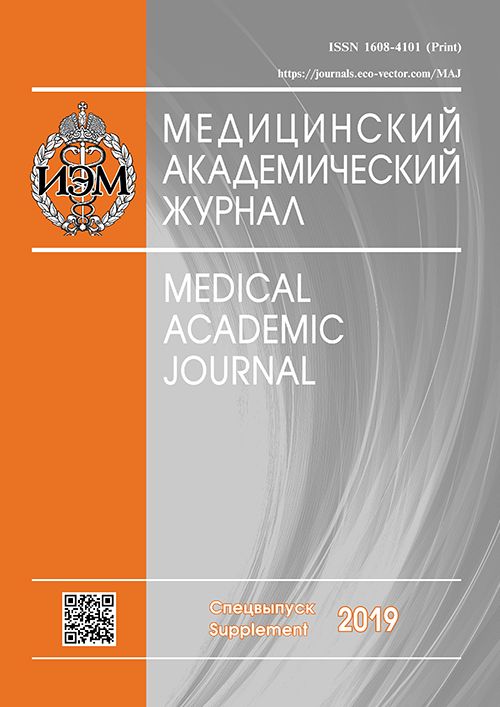GASTROINTESTINAL DYSFUNCTIONS AND PERIPHERAL INFLAMMATORY CYTOKINES IN PARKINSON’S DISEASES
- Authors: Miliukhina IV1,2,3, Ermolenko EI1,4, Ivanova AS1, Gracheva EV1, Kotyleva MP1, Agapova EA1, Suvorov AN1,4
-
Affiliations:
- Institute of Experimental Medicine, Saint Petersburg
- Pavlov’s State Medical University of Saint Petersburg, Saint Petersburg
- Petersburg Nuclear Physics Institute named by B.P. Konstantinov of National Research Centre “Kurchatov Institute”, Saint Petersburg
- Saint Petersburg University, Saint Petersburg
- Issue: Vol 19, No 1S (2019)
- Pages: 93-94
- Section: Articles
- URL: https://journals.eco-vector.com/MAJ/article/view/19342
- ID: 19342
Cite item
Full Text
Abstract
Full Text
Introduction. The intestinal microbiota influence neurodevelopment, modulate behavior, and contribute to neurological disorders. However, a functional link between gut bacteria and neurodegenerative diseases remains unexplored. Parkinson’s disease (PD) is the second most common neurodegenerative disorder. The dissemination of the pathological process beyond the central nervous system causes a variety of non-motor symptoms in patients with PD. Gastrointestinal dysfunction (GD), in particular constipation, affects up to 80% of PD patients. Neuroinflammation is obviously involved in PD pathogenesis. In PD microglial activation suggests a chronic inflammatory process, recent data have shown that inflammatory mediators including cytokines and chemokines could play a role in PD pathogenesis. Gut microbiota are different between individuals with PD and healthy controls [1, 2]. However how dysbiosis arises and whether this feature contributes to PD pathogenesis remains unknown. We sought to determine whether human gut microbiota effect on the plasma cytokine profile. Our aim was to evaluate gut microbiome and the serum cytokine profile in PD, also assess the relationship between gut microbiome and peripheral inflammation. Material and methods. Study was performed on the group of 55 subjects with PD in 1.5-3.0 Hoehn-Yahr (mean age 63.70 ± 2.3, 26 males). The investigated patients were observed in the Center for the Neurodegenerative diseases of the Institute of Experimental Medicine. The study was approved by the local ethical committee, all study participants signed an informed consent. The diagnosis of PD was established in accordance with the MDS criteria [3]. Exclusion criteria covered a broad range of conditions and medications that could independently effect on the gut microbiota. All PD patients were using antiparkinsonian medication. L-dopa equivalent dose (LED) was calculated. Study of the fecal samples was performed by real time polymerase chain reaction (PCR) method and bacteriologically. Cytokines (IL-1β, IL-6, IL-10, TNF-α and IFN-γ) were measured by sandwich enzyme-linked immunosorbent assay (ELISA) (Vector-Best, Russia). Results. In the study evaluating the frequency of various GD symptoms in 55 patients with PD, abnormal salivation, dysphagia, nausea, constipation and defecatory dysfunction were present in 60%, 48%, 26%, 72%, and 66% of subjects, respectively. Among the studied parameters, only age of PD onset and LED correlated with GD dysfunction. In group patients with debut of the diseases before 45 years the level of total bacterial mass and Faecalibacterium prausnitzii was lower than in other patients (p < 0.05). No correlation was found between the GD symptoms and patients age, gender, antiparkinsonian treatment, level of activity or dietary fiber intake. We found the correlation between level of the IFN-γ and Enterobacter, Escherichia coli, Lactobacillus (r = -0.48, r = -0.45, r = -0.44), between level of the IL-6 and Enterobacter, Escherichia coli (r = -0.40, r = -0.45, p < 0.05). Conclusion. The exact mechanisms by which gut microbiota contribute to PD are still poorly understood, despite the role of gut microbiota in the development of PD being well documented. In our study, a relationship was found between the intensity of dysbacteriosis and the level of proinflammatory cytokine IFN-γ, IL-6. We show that disturbances in plasma cytokine level could be more profound in PD patients with altered composition of intestinal microbiota, which may explain the mechanism of influence of microbiota composition on the PD manifestations.About the authors
I V Miliukhina
Institute of Experimental Medicine, Saint Petersburg; Pavlov’s State Medical University of Saint Petersburg, Saint Petersburg; Petersburg Nuclear Physics Institute named by B.P. Konstantinov of National Research Centre “Kurchatov Institute”, Saint Petersburg
E I Ermolenko
Institute of Experimental Medicine, Saint Petersburg; Saint Petersburg University, Saint Petersburg
A S Ivanova
Institute of Experimental Medicine, Saint Petersburg
E V Gracheva
Institute of Experimental Medicine, Saint Petersburg
M P Kotyleva
Institute of Experimental Medicine, Saint Petersburg
E A Agapova
Institute of Experimental Medicine, Saint Petersburg
A N Suvorov
Institute of Experimental Medicine, Saint Petersburg; Saint Petersburg University, Saint Petersburg
References
- Scheperjans F, Aho V, Pereira PA, et al. Gut microbiota are related to Parkinson’s disease and clinical phenotype. Mov Disord. 2015;30(3):350-358.
- Unger MM, Spiegel J, Dillmann KU, et al. Short chain fatty acids and gut microbiota differ between patients with Parkinson’s disease and age-matched controls. Parkinsonism Relat Disord. 2016;(32):66-72.
- Postuma R, Berg D, Stern M, et al. MDS clinical diagnostic criteria for Parkinson’s disease. Movement Disorders. 2015;(30):1591-1601.
Supplementary files








